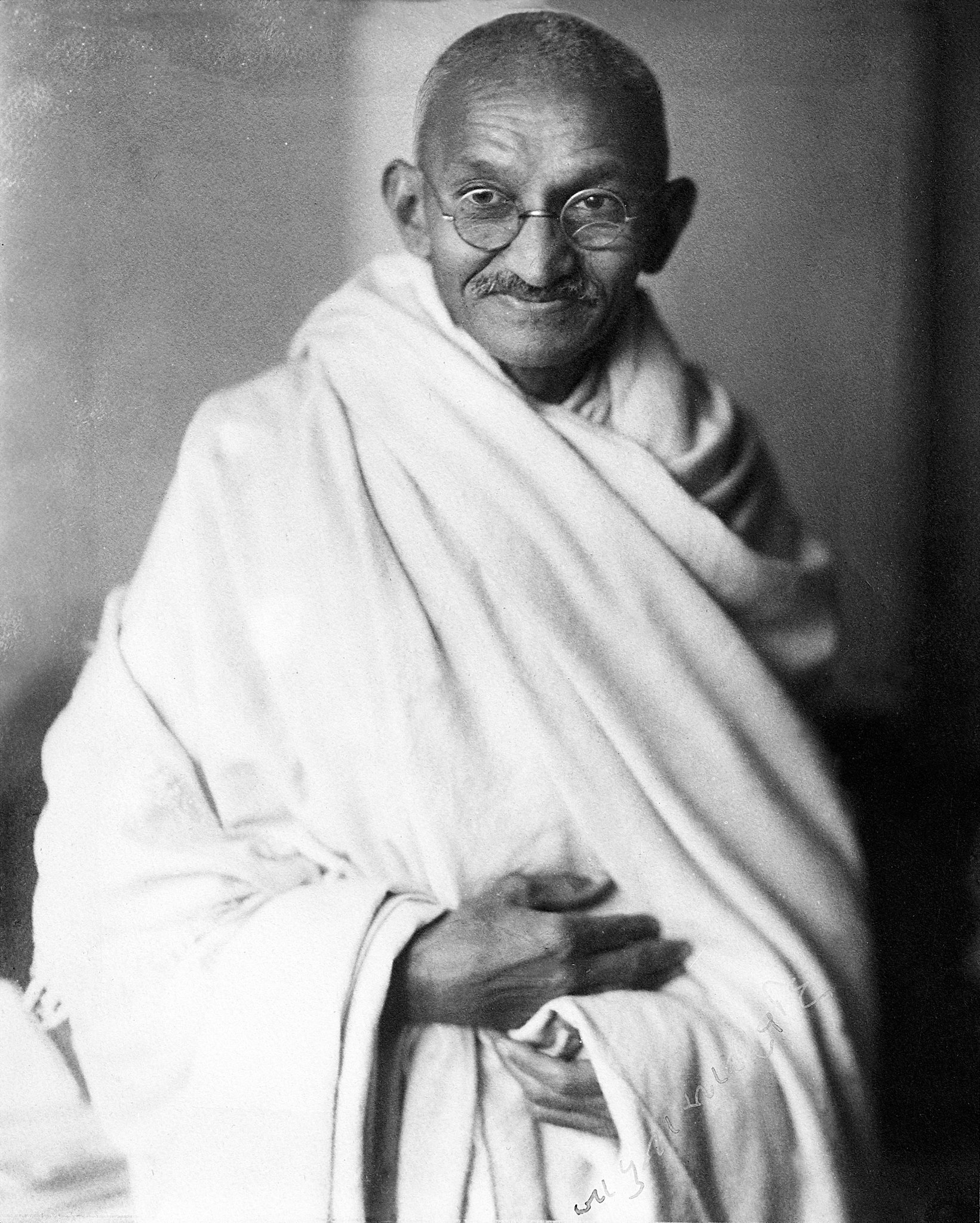More languages
More actions
(Created) Tag: Visual edit |
No edit summary Tag: Visual edit |
||
| Line 1: | Line 1: | ||
{{Infobox politician|honorific_prefix=Mahātmā|name=Mohandas Gandhi|native_name=મોહનદાસ ગાંધી|image_size=200|birth_date=2 October 1869|birth_place=Porbandar, [[British Raj]]|death_date=30 January 1948|death_place=New Delhi, [[India]]|death_cause=Assassination|nationality=Gujarat|political_party=[[Indian National Congress]]|image=Mohandas Gandhi.png}} | {{Infobox politician|honorific_prefix=Mahātmā|name=Mohandas Gandhi|native_name=મોહનદાસ ગાંધી|image_size=200|birth_date=2 October 1869|birth_place=Porbandar, [[British Raj]]|death_date=30 January 1948|death_place=New Delhi, [[India]]|death_cause=Assassination|nationality=Gujarat|political_party=[[Indian National Congress]]|image=Mohandas Gandhi.png}} | ||
'''Mohandas Karamchand Gandhi''' (2 October 1869 – 30 January 1948), also known as '''Mahatma Gandhi''', was an Indian [[Anti-colonialism|anti-colonial]] activist and [[Bourgeois revolution|bourgeois revolutionary]]. He was an [[Idealism|idealist]] and led the peasantry to support the [[National bourgeoisie|bourgeois]]-led [[national liberation]] movement against [[United Kingdom of Great Britain and Northern Ireland|British]] occupation. His non-violent tactics opposed [[imperialism]] while also discouraging a [[Proletarian revolution|mass revolution]]. The bourgeoisie turned against him after independence once his values began to hinder [[Dictatorship of the bourgeoisie|their rule]], leading to his assassination.<ref>{{Citation|author=[[E. M. S. Namboodiripad]]|year=1958|title=The Meaning of Gandhism|title-url=https://redsails.org/the-meaning-of-gandhism/}}</ref> | '''Mohandas Karamchand Gandhi''' (2 October 1869 – 30 January 1948), also known as '''Mahatma Gandhi''', was an Indian [[Anti-colonialism|anti-colonial]] activist and [[Bourgeois revolution|bourgeois revolutionary]]. He was an [[Idealism|idealist]] and led the peasantry to support the [[National bourgeoisie|bourgeois]]-led [[national liberation]] movement against [[United Kingdom of Great Britain and Northern Ireland|British]] occupation. His non-violent tactics opposed [[imperialism]] while also discouraging a [[Proletarian revolution|mass revolution]]. The bourgeoisie turned against him after independence once his values began to hinder [[Dictatorship of the bourgeoisie|their rule]], leading to his assassination.<ref name=":0">{{Citation|author=[[E. M. S. Namboodiripad]]|year=1958|title=The Meaning of Gandhism|title-url=https://redsails.org/the-meaning-of-gandhism/}}</ref> | ||
== Early life == | |||
Gandhi was born in a family of servants to the [[Feudalism|feudal]] rulers of Porbandar State (modern-day [[Gujarat]]).<ref name=":0" /> | |||
== Independence movement == | |||
During the [[First World War]], Gandhi recruited soldiers for the British Army because he believed the sacrifice of Indian soldiers would strengthen the independence movement in India.<ref name=":0" /> | |||
In 1921, he denounced the British government and called for a boycott of the British legislature. He opposed involvement in the [[Second World War]].<ref name=":0" /> | |||
== Post-independence == | |||
In 1947, Gandhi proposed transforming the Indian National Congress into a non-political organization that would only serve the people. The Congress rejected this proposal.<ref name=":0" /> | |||
== See also == | == See also == | ||
Latest revision as of 12:59, 1 June 2024
Mahātmā Mohandas Gandhi મોહનદાસ ગાંધી | |
|---|---|
 | |
| Born | 2 October 1869 Porbandar, British Raj |
| Died | 30 January 1948 New Delhi, India |
| Cause of death | Assassination |
| Nationality | Gujarat |
| Political party | Indian National Congress |
Mohandas Karamchand Gandhi (2 October 1869 – 30 January 1948), also known as Mahatma Gandhi, was an Indian anti-colonial activist and bourgeois revolutionary. He was an idealist and led the peasantry to support the bourgeois-led national liberation movement against British occupation. His non-violent tactics opposed imperialism while also discouraging a mass revolution. The bourgeoisie turned against him after independence once his values began to hinder their rule, leading to his assassination.[1]
Early life[edit | edit source]
Gandhi was born in a family of servants to the feudal rulers of Porbandar State (modern-day Gujarat).[1]
Independence movement[edit | edit source]
During the First World War, Gandhi recruited soldiers for the British Army because he believed the sacrifice of Indian soldiers would strengthen the independence movement in India.[1]
In 1921, he denounced the British government and called for a boycott of the British legislature. He opposed involvement in the Second World War.[1]
Post-independence[edit | edit source]
In 1947, Gandhi proposed transforming the Indian National Congress into a non-political organization that would only serve the people. The Congress rejected this proposal.[1]
See also[edit | edit source]
References[edit | edit source]
- ↑ 1.0 1.1 1.2 1.3 1.4 E. M. S. Namboodiripad (1958). The Meaning of Gandhism.
